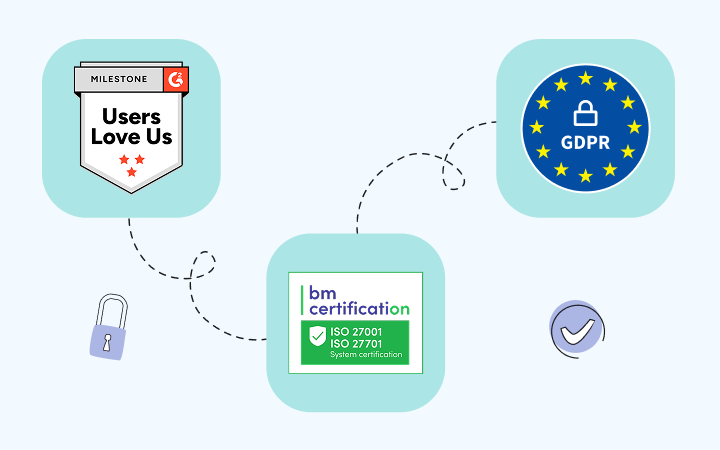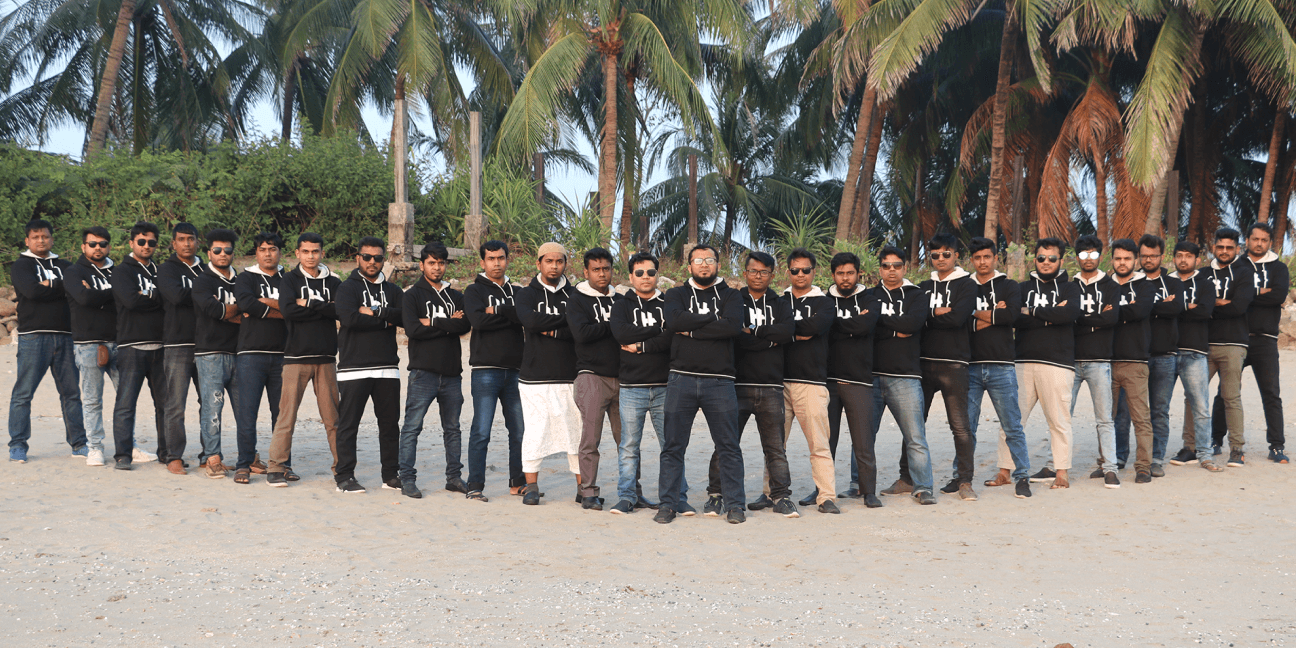


🍪 Allow functional cookies?
We use Zendesk messaging software for easy communication with our clients. Zendesk uses cookies to interact with website visitors and provide chat history.
See our Privacy Policy for more info. You can change your cookie preferences at any time in our Cookie Settings.





HasTech is a team of experienced web designers and developers. Founded in 2015 in Bangladesh, HasTech offers various WordPress, Shopify, and HTML products and product packages as well as web design and development. Its three top-selling countries are USA, India, and UK, yet overall the company sells its products to customers in more than 80 countries. A variety of 1,000+ product types and services have reached more than 150,000 customers since the company's inception.
HasTech “met” DeskTime in April of 2020, just when it became clear that the pandemic is going to stick around for a while and that remote work may become the “normal” setting for a long time. However, it wasn’t the first time the company had moved its employees to a remote environment.
Aslam Hasib, the managing director of HasTech, shares that when the company was founded employees were working remotely for some time and only later decided to move to an office environment. The reason for the move was the lack of a remote employee monitoring solution, as there were concerns that the employees may be underperforming. The managing director explains that if he had heard about time tracking software solutions back then, it might have been a game-changer. As the company’s work was mostly project-based, the biggest issue was the time spent on finishing the projects.
“The normal working time on a project for us is 20–30 days. Back then it took 60 days for some of my employees to finish their work. We lost many customers because the actual project length ended up being twice the estimated length. Eventually, we decided to move into an office to increase productivity and efficiency.”
As the company moved to an office environment the situation improved. Yet the management team was still unable to get hold of how employees were spending their work hours. HasTech management tried to pay regular visits to their employees’ desks but, as the company had already grown by the time, that kind of monitoring wasn’t efficient and didn’t leave a positive impact on workers’ productivity levels.
HasTech was struggling with deadlines. Although the company was overall stable, there was a feeling that it could perform better, and therefore, grow faster.
As the pandemic made its transformative entrance into the reality of 2020, HasTech decided to move to a remote work environment. Based on the company’s previous experience, managing director Aslam knew that this time HasTech had to think of a management solution to ease the burden of the remote work both for employees and the management side. Luckily, the solution was found rather quickly as one of Aslam’s brothers was working for a company that uses DeskTime. Aslam was impressed by the affordable pricing models and variety of features available. Even though the company was exploring several other time tracking solutions, DeskTime ended up being their final choice.
Since moving to remote work in April of 2020, the experience has been significantly more successful than the first time HasTech tried working remotely. Using a time tracking software certainly had a lot to do with it. Time tracking has increased employees’ productivity, therefore increasing the number of projects accomplished and the amount of monthly revenue. Moreover, HasTech has calculated the ROI (return on investment) of time tracking with DeskTime:
“Although we are spending nearly $300 per month on the time tracking software, it saves us around $2,000 monthly. It saves money, and at the same time, it increases revenue. So it’s beneficial to us in two crucial ways”
By now, HasTech has gotten used to having a time tracking solution as a tool for daily use. Aslam says that around 98% of his employees are satisfied with the novelty of work time tracking. The company's overall productivity level has increased, and the workers feel a lot more motivated to keep their performance top-notch despite working remotely.
The company trusts its workers so it doesn’t use DeskTime for maintaining an excessive control over its employees. However, Aslam notes that DeskTime features are a helping hand when it comes to noticing any unproductive patterns among workers. The productivity analysis provided by DeskTime makes it possible to differentiate whether the employee is struggling with a particular project or is lacking motivation overall. When the reason is clear, the company can provide the needed guidance and support.
HasTech enjoys all of the DeskTime features, however, the company chose to continue using Trello for project management purposes. Luckily, integrating DeskTime with Trello is effortless. After establishing a connection between both tools, Trello delivers projects to the DeskTime project section and they can be tracked with the DeskTime project timer.
HasTech finds the Automated screenshots feature helpful when monitoring its employees’ work pace. Screenshots are used for accountability – when employees struggle with completing tasks or experience any other issues. Aslam mentions that the feature helps with keeping up the overall quality of work as employees know that they can be randomly monitored.
Due to the remote work environment, the company’s human resource team also enjoys the benefits of using a time tracking solution. DeskTime provides a vast database with all the details needed to calculate the total amount of time spent working for each employee, their productivity and efficiency analysis, and more. As a part of HasTech work is project-based, sometimes the company’s clients want to know the exact time spent working on a particular project. When such request is received, providing a report of activity on a project is easy with the help of DeskTime.
The outbreak of the virus and the subsequent shift to remote work has undoubtedly affected the daily lives of HasTech employees. When asked about whether the pandemic has influenced the company form the business side, Aslam says that it hasn’t experienced any loss of clients – quite the opposite. Since March the company's revenue has increased by nearly 40%.
The managing director adds that they observed that employees have been working more hours since they’ve gone remote. Although the work time set is the usual nine-to-five kind, some workers end up working longer than that. There is no one clear reason for this pattern, however the cause may be that there is no “end of the workday” feeling, which occurs in the office environment. As Aslam explains, when working remotely, some of the employees can be so immersed in their tasks that they can lengthen their workday up to 2–3 hours even though they’re not asked to do so.
A quick peek into remote work stats and trends for 2020, it’s clear that remote work IS more efficient than the traditional office setting. Working remotely can provide more flexibility, therefore workers can adjust their work hours according to their productivity levels. However, it seems that workaholism is a tendency that may occur often when working remotely. Employees find it more difficult to unplug from work when working from home as there’s no need to “leave the office”. And yet, due to the global remote work experience in 2020, it seems that a shift to the new “normal” for the work environment is just around the corner. A survey of 11,311 DeskTime users showed that:
Only 22.5% of workers want to return to the office
22.9% would like to retain the remote work
And 37.1% would prefer a new hybrid work model – combining both remote and office-based work
The shift into new “normal” may be a reason to think about implementing a time tracking solution for those companies that haven’t done it yet. Remote work environment is a new territory that needs adjusting from both employees and employers. Having a tool that eases the burden of transitioning can be crucial for all parts involved.
The virus outbreak hasn’t slowed down growth for HasTech – the company is securing its place in the international market. With an increasing number of clients, the need for well-established customer support grows along. To provide it, some teams of the company work seven days a week, managing their schedules so that each team member has a weekly day off.
HasTech has also chosen to provide a live support chat for their clients which is a solution that requires a lot of employees’ maintenance. Without the help of time tracking software that would be harder to manage. Yet with all the work time data tracked and made available for an overview, managing the shifts for a growing company is smooth and easy. As Aslam explains, HasTech doesn’t use the Shift Scheduling feature but anticipates that the company may start to do so in the nearest future. However, it uses the option to adjust the tracking days and the working time for its employees, in order to choose on which days the employees will be tracked and to customize their working hours.
Managing director Aslam is sure that HasTech will continue to use DeskTime after returning to the office in the future. The company hasn’t yet implemented any bonuses for the most productive employees, as remote work conditions aren’t the same for everyone, keeping in mind workers who have to take care of their families at home. However, the managing director states that when the employees return to the office environment, the productivity bonuses will be provided.
Ever since the beginning of time tracking the company has kept its performance top-notch. Employees feel motivated to put their potential into work. Aslam adds that those who work at HasTech are talented and skilled at what they do. Talent mixed with motivation may be the “it” factor for the success and growth of the company. And DeskTime is more than glad to help with keeping up the great performance of HasTech.
Forget manual entries and distractions. With DeskTime, time tracking runs on autopilot—zero effort needed.